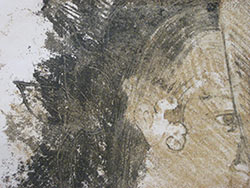Stephen E. Ostrow Distinguished Visitors
Dario Gamboni
"Paul Gauguin, the 'Listening Eye' and the Universality of Art"
October 28, 2013

Paul Gauguin, "Two Tahitians Gathering Fruit" (recto), detail, 1899-1900, traced monotype, National Gallery of Art, Washington DC [photo D. Gamboni]
Paul Gauguin's interest in the art of the world was fostered by his half-French, half-Peruvian origin, by his peripatetic life and by his equation of the "primitive" with the essential. It was also fed by the development of archeology, art history and ethnography in the context of late nineteenth-century colonialism. From Lima to Paris to Auckland, Gauguin managed to see objects as soon as they became accessible, and these encounters had a deep impact on his own art. This lecture will attempt to identify what the artist was looking for and what he found in them as well as what he meant when he postulated a universality of art and spoke, apropos of Persian carpets and "Oriental art" in general, of "a complete dictionary of the language of the listening eye".
Dario Gamboni is professor of art history at the Université de Genève and research councilor for art history of the Swiss National Science Foundation. He is an honorary member of the Institut Universitaire de France, Meret Oppenheim Prize 2006, and was a Fellow at CASVA, the Henry Moore Institute, and the Clark Art Institute. He has been a guest professor at the universities of Buenos Aires, Freiburg, Frankfurt, Mexico, New Delhi (JNU), Sao Paulo, Strasbourg and Tokyo, and at the École Normale Supérieure in Paris. He has curated and cocurated exhibitions, among which Iconoclash and Making Things Public in Karlsruhe (ZKM) and Une image peut en cacher une autre in Paris (Grand Palais). His publications include The Destruction of Art: Iconoclasm and Vandalism since the French Revolution (New Haven/London 1997), Potential Images: Ambiguity and Indeterminacy in Modern Art (London 2002), The Brush and The Pen: Odilon Redon and Literature (Chicago/London 2011), and Gauguin at the "Mysterious Centre of Thought" (Dijon/London, forthcoming).